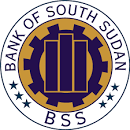The Central Bank on Wednesday said it will limit the amount of weekly auctions to commercial banks and forex bureaus, due to the recent strengthening of the local pound (SSP) against the U.S dollar in the market.
Johnny Ohisa Damian, Governor of the Bank of South Sudan (BOSS) said they have decided to reduce the auction money from 20 million to 10 million dollars citing appreciation of the pound against the dollar.
“This decision was based on the auction supervisory committee bids analysis, and the trend of the foreign exchange market development which indicates that the market is liquid and doesn’t need additional dollars,” Ohisa noted in his statement issued in Juba.
In August the central bank had increased weekly auctioning of hard currency in a bid to mop up excess liquidity as the pound increasingly lost ground against the dollar.
Ohisa disclosed that the SSP this month appreciated against the dollar by 9.4 percent on average from 695.5 dollars on August 4th to the current 635 dollars.
He said this development represents noticeable positive impact on the foreign exchange market.
Ohisa, also revealed that the monthly consumer price index (CPI) declined by 1.45 percent in August compared to 4.97 percent in July.
In addition, he noted that annual inflation has declined to about 2.54 percent in the month of August compared to the July annual increment of 6.43 percent.
“In light of these developments the bank of South Sudan will pursue contractionary monetary policy, while considering other monetary policy instruments under it’s disposal, as well as maintaining it’s presence in the foreign market, and continue to intervene occasionally in smoothening high exchange volatility,” Ohisa said.
South Sudan’s economy has been struggling to recover after years of conflict that disrupted oil production it’s major source of foreign currency.
The country depends nearly 98 percent on oil-revenue to finance it’s annual fiscal budget.















